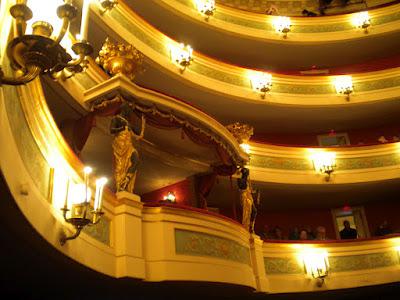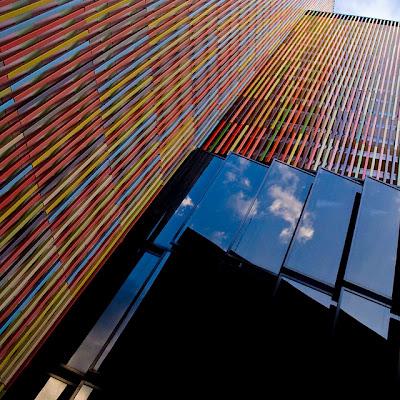Of course, first on the agenda was catching up with my friend Mark, who met me at my hotel at the civilized hour of noon, after I'd had time for the expansive breakfast at Hotel Meier and a long, hot shower.
Mark and I were at Indiana University together while he was working on his doctorate and I was finishing up undergrad and getting my master's. Since then, I've visited him in Germany many times and in many different cities. I remember the first time, in the beautiful old University town of Heidelberg, where Mark let me stay with him in his studio apartment. We listened to the World Series on a radio channel that served the American military station nearby. I'll never forget the injured Kirk Gibson's game-winning home run, and the image of him hobbling around the bases. Of course I had to imagine the image at the time, but it's since become iconic in baseball lore.
I've also visited Mark in Darmstadt, where I took a break from auditioning to indulge a terrible head cold while sleeping on his couch. And I remember a production we saw in Munster, when Mark was living and working there. It was Offenbach's Countess of Gerolstein, but it was in drag. The Countess was a guy, and the Military Officer was a woman dressed like a man. Only in German theater.
Mark now lives with his partner in Dusseldorf (where I've never been), but he's now full-time freelance, and currently in rehearsals at Munich's Gaertnerplatz for an obscure opera called Josef Sus. It opens after I leave, so I won't get to see it. But Mark did manage to score a couple of tickets for us to see the matinee of Grand Hotel, an American musical being performed at Gaertnerplatz.

Gaertnerplatz, a 19th century opera hous in Munich
We stopped at a coffee house to get out of the cold and have a snack before the show. After the breakfast of meat, cheese, yoghurt, fruit, cereal and an egg I wasn't really hungry, so I just savored the "cafe creme" (which doesn't have cream in it; "creme" refers to the finish of the coffee, the way it looks a bit creamy) and watched Mark eat his Flammenkuchen. I've always called them tarte flambes, their French name, because I ate them when I was singing in Strasbourg. Alsace is in fact the region where this dish originated, and I don't think the Munich version measures up.
The cakes looked so good, and I reasoned I'd be over-hungry by the end of the show, so I had a cheesecake while Mark had a chocolate cake and we both had more coffee. The cakes were excellent.
On to the show! Grand Hotel was performed in German translation, which didn't detract from the plot at all, since it's set it 1929 Berlin. What a treat it was to see a musical done with such good singers. It didn't have the flash-and-dash of Broadway productions, but it worked on a more immediate level; these singing actors were believable characters. Of course it didn't hurt that the story involved a romance between a young man and an older woman, always a pertinent topic for me. The show was quite long, but always entertaining.
On the other hand, the concert I went to the next evening was just long. I'd checked out of Hotel Meier and moved into my friend Phil's house in Planegg, a suburb about a 20 minute S-Bahn ride from Munich's main station. Phil is also a college friend, and I've visited him several times, but always in Munich. Phil got a job with the Munich Philharmonic shortly after leaving school. He married a German woman, had two children and is now a senior member of the orchestra.
Phil had the week off while I was visiting, so he wasn't playing in the orchestra's concert and we were able to go together. (Of course sitting together required special dispensation from the head usher, because I had a regular ticket and he had an orchestra pass.) It was a performance of Berlioz's Damnation of Faust - not a symphony, not an opera, but something in between. There were four solo singers, including the legendary Jose Van Dam and the lovely lyric mezzo Beatrice Uria Monzon, but he orchestra was consistently too loud for the singers. The piece has a few wonderful sections, but the whole thing could use an edit. I was dozing off by the middle of the third hour.

The Brandhorst Museum, Munich, by Marja Van Bochove
The next day Phil and I went to the Brandhorst Museums, Munich's new place for contemporary art. It's a great space, designed with specific works in mind, especially the expansive Cy Twombly installations. One of those is a series of giant roses (reminiscent of Monet's room of lily's in New York's MOMA) and the other is a series depicting a naval battle of 1571.
A good portion of the Brandshorst is devoted to conceptual art. There's an assembly of 26,000 pills, an installation of four televisions playing different parts of a headache commercial (to give the viewer a headache?), and Andy Warhol's ouvre is well-represented.
Of course, the main art museums in Munich are the Alte and Neue Pinakoteks. The old has medieval through 19th century; the new has impressionist, expressionists and beyond. But we'd been there already. There's nothing like the first visit to a museum, with the exiting discovery of artists you're not familiar with. If you've been to the Pinakoteks ( or if you haven't, but you have an interest in contemporary art), Munich's Brandhorst museum is a great place to spend an afternoon.

